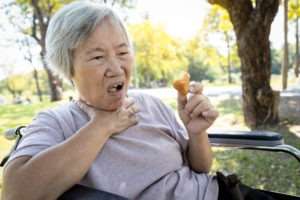
Choking accidents can be a serious sign of nursing home neglect and abuse. At a base level, nursing home staff should be watching over their residents and making sure they are safe from harm. If a choking accident occurs and the situation is not addressed in a timely manner, it is a telltale sign that staff members are neglecting their duties and putting their residents in harm’s way.
Residents of nursing homes are there because they can no longer properly care for themselves. While every patient is different, nursing homes should be equipped to deal with issues related to eating, sleeping, hygiene, and more. While accidents do happen, the nursing home staff should be there to prevent choking accidents to the best of their abilities.
Even though the exact definition of neglect may be determined on a case-by-case basis, leaving a patient alone while they eat and failing to come to their aid when they suffer complications is a textbook example of neglect.
Why Do Elderly People Have Choking Accidents?
According to research from the National Center for Biotechnology Information (NCBI), individuals over the age of 65 often have choking accidents due to medical conditions, physical defects, awkward positioning, and psychological issues. Ultimately, as people grow older, they become less capable of chewing and swallowing food.
A common medical condition that makes it more difficult to eat or drink is known as dysphagia. In some cases, dysphagia may cause pain while eating, or it may completely prevent swallowing altogether, according to the Mayo Clinic. Overall, the exact cause of the choking accident may depend on a combination of internal and external forces, especially if they are currently staying in an assisted living facility or hospital.
In addition to dysphagia, some of the specific causes of choking accidents among the elderly include:
- Overall frailty
- Improper posture while eating, preventing the food from digesting properly
- Poor dental hygiene, including lack of teeth, issues with dentures, or gum diseases
- Medications that make it difficult to eat, including opioids, sedatives, and antipsychotics
- Lung infections
- Difficulty gripping food or objects
- Fatigue
- Difficulty moving
With so many medical conditions increasing the risk of choking in the elderly, nursing homes should employ preventative measures to combat the risks, such as cutting up their food into smaller pieces.
For a free legal consultation, call (855) 605-2959
Preventing Choking Accidents
Choking accident prevention involves a combination of environmental factors, safer eating routines, proper posture, and more. These prevention methods will need to cater to the patient’s unique needs, given their specific medical conditions, physical abilities, and psychological well-being.
Some of the more common methods to prevent choking in nursing homes include:
- Providing proper lighting
- Discouraging the patient from talking while eating
- Removing distractions while the patient is eating
- Making sure that food is thoroughly chewed before swallowing
- Not rushing the individual while they are eating
- Sitting upright while eating
- Doing one task at a time, instead of having the patient eat and drink simultaneously
- Bending the chin down when eating to ensure proper digestion
These preventative measures can save lives.
A Nursing Home Abuse Lawyer Will Fight for Your Rights
Here at High Stakes Injury Law, we take nursing home abuse very seriously. While no case can be guaranteed to award compensation, we will work to defend your rights and hold the liable parties responsible for their negligence. If someone else is found liable for your case of nursing home abuse, you may be eligible for compensation related to your mental, physical, and financial suffering.
To learn more about your legal rights in nursing home neglect cases, contact a High Stakes Injury Law representative today at (702) 605-6671 to get started with your free consultation.
Call or text (855) 605-2959 or complete a Free Case Review form

